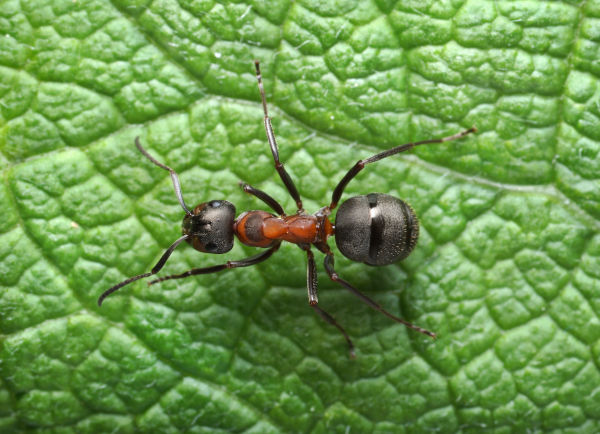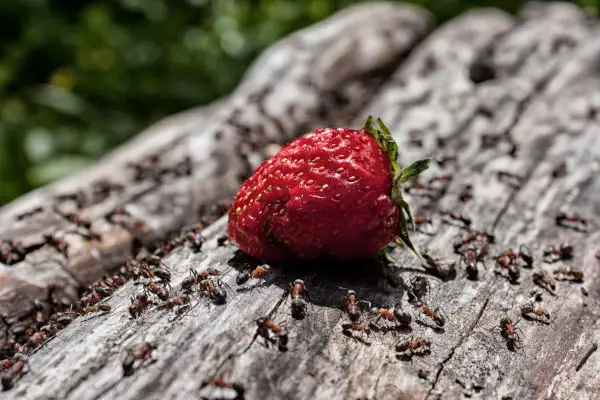Can Bearded Dragons Eat Ants? (are they dangerous?)
If you are researching the best foods for your Beardie (Click here to learn, from this guide, what your Beardie should really be eating), you may be curious to know if ants are a good food source.
Can bearded dragons eat ants? No, Bearded Dragons should not eat ants. This is because they produce Folic Acid as a natural defense, which could harm your Beardie and also have a poor calcium to phosphorous level.
| Are these foods dangerous for your Beardie? | |
| Avacado? Click here to learn, from this guide, if this food is dangerous |  |
| Superworms? Click here to learn, from this guide, if this food is dangerous |  |
Now that you know that they are a bad idea keep reading to learn what lizards still eat ants, the known benefits they offer and other known risks associated with them, and much more.
What is an ant?

Running Ant (Formica Rufa)
Before we look into ants as a potential food source for your Bearded Dragon, let me explain what an ant is. I understand that the chances are, you know what an ant is, but do you know its scientific name, and what family it belongs too? Exactly…
Other names and family
An Ant, also known as Formica, which is a Latin word for Ants. It comes from the Formicidae family. According to Wikipedia, they are a eusocial insect. This term “eusocial” relates to their unique and extreme organizational skills. As you may know, they work very closely to complete daily tasks.
Appearance
Ants have quite a distinguishing look. With their slender waists and big head and antennas. When you look at their bodies (refer to the image above), it is essentially three parts.
What nutritional content does an ant have?
Source: ResearchGate (per 100g) *
| Name | Amount | Unit |
| Phosphorous | 105.85 (Abdomen) | mg |
| Potassium | 46.37 (Abdomen) | mg |
| Calcium | 26.10 (Abdomen) | mg |
| Folic Acid | 0.451 | mg |
| Magnesium | 10.93 | mg |
* See source for full list
Are there any health benefits with ants?

Ants and Strawberry
Now that you know some of the contents of ants, you may be wondering if there are any known health benefits with it. For that reason, in this section, I will explain some of these for you.
May help to fight cancer
According to this site, there was a study conducted by Italian scientists. They concluded that there are high levels of antioxidants. These antioxidants are also found in fruit and vegetables, so some might say, so what?
The fact is, these antioxidants, found in ants, were found to have several times more concentration when the insects were grounded down.
Antioxidants are important in the fight against oxidation. This chemical reaction creates free radicals, which are believed to increase the risk of cancer.
Kinder to the environment
Ants provide a good source of protein, especially when compared to other forms of livestock, such as cows. So you may think, so what, we can just eat cows, right? The problem with cows is they are big, especially when compared to a minuscule ant.
These cows need lots of food and water and space. This is usually at the consequence of natural resources, such as the rain forest. Large areas of the rainforest are cleared to support the growing demand of cows. With ants, they take so much less space and leave a smaller footprint on the environment.
High Protein Content
In the last section, I briefly explained that ants are another source of protein, remember? Well, I did not mention how good they are, when compared gram for gram.
To put this into perspective, according to this site, for 100g of fire ants, you will typically get 13.9g of protein. This is quite good, for such a minute insect.
Are there any negatives or known risks?
Now that you understand what the potential benefits of ants are, you still may be wondering if there are any negatives, or known risks associated with it. Therefore, in this section I will discuss this.
Formic Acid Issues
One of the biggest concerns with ants is Formic Acid. What is Formic Acid? According to Wkipedia, it is a colourless liquid that has a penetrating and strong smell. It is sprayed from most ants to protect themselves from their predators. An example of this, is the wood ants.
As you can imagine, this poses quite a risk for Bearded Dragons, because it is meant to repeal these types of predators. And, as you know, Beardies prefer live insects for their meals, so they are susceptible to these formic acid attacks.
However, there are some lizards that do still eat these ants, regardless. They are the Horn Lizard (Phrynosoma), also known as “horny toad”. But, they are naturally prepared to deal with these risks.
Poison from Pest Control
In captivity, ants are regarded as pests. So, whenever they are found around the house they are typically dealt with. This is typically in the form of poison to eradicate them.
The problem with this is, the risk they may pass on to your Beardie. Meaning, what if your Beardie consumes an ant that is pumped full of pest control poison? Not good to say the least. Hence the reason why extra precaution is required with them.
Poor Calcium to Phosphorous levels
When you refer to the table above, you can see the calcium and phosphorous levels per 100g, right? Well, the issue with this is the amount of phosphorous compared to calcium.
According to this site, the ideal ratio should be 2:1, in favour of calcium. And, from the figures above you can see that it is not even close. This ratio is important because high levels of phosphorous reduces the absorption of calcium in your Beardie.
Should you feed your Beardie ants?
Now that you know the potential health benefits and risks associated with ants. You may be looking for a conclusive answer, to see if you should be feeding it to your Beardie or not, right?
In my opinion, no, you should not feed your Bearded Dragon ants. The Folic Acid issue discussed above is more than enough to make you avoid this.
Let me be frank, why bother? Especially when there are so many other foods that you can feed your Beardie (Click here to learn, from this guide, what your Bearded Dragon should be eating).
What about your Baby Bearded Dragons?
So, you can see that I don’t recommend ants for your Beardie. But, some of you may be wondering how this should affect your baby Bearded Dragon, right?
Personally, I feel that most people will have already expected this answer. But to be clear, no, you should not feed ants to your baby Bearded Dragon. This is for the same reasons above.
The reality is, baby Beardies are even more fragile, right? Therefore, you need to be even more careful with their diet (Click here to see what you should be feeding your baby beardie).
Related Questions:
In this section, I will answer some questions related to Bearded Dragons eating habits and behavior. If you have any other questions, feel free to contact me.
Q: Can Bearded Dragons eat lettuce?
Yes, Bearded Dragons can eat lettuce, but, like Radicchio, it should be more of a treat (Click here to see why). The reality is, there are many other food sources on offer that provide better nutritional benefits.
Q: Do Bearded Dragons like warm temperatures?
Yes, Bearded Dragons do like warm temperatures, they are naturally from Australia (Click here to see how they managed to get to Europe and the united states). And the best thing to do, with any pet, is to emulate their natural habitat. This is why they need the heating, lighting, and enclosure set up to emulate this.
Q: Can flowers be given to your Beardie?
Yes, some flowers can be given to your Beardie. According to this site, flowers such as Borage (or starflower) can be given to them, albeit in small doses. However, flowers such as Marigolds are not a good idea for Bearded Dragons (Click here to see why).